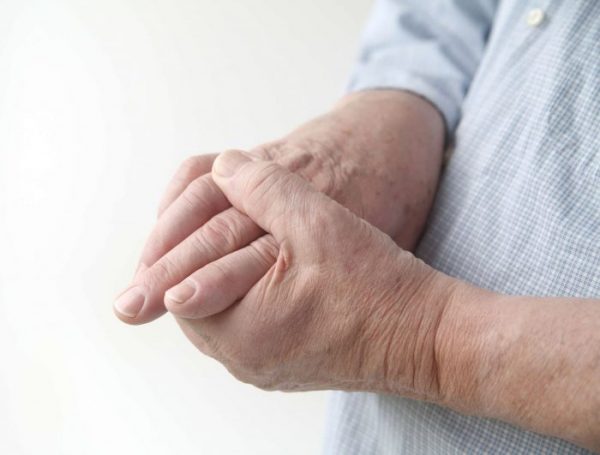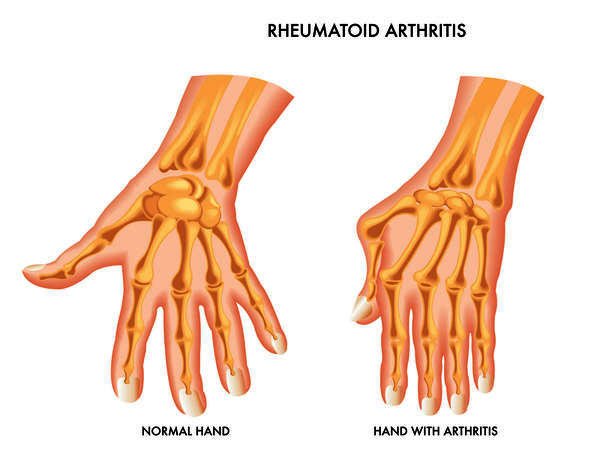ABOUT RHEUMATOID ARTHRITIS TREATMENT
Rheumatoid arthritis treatment aims to alleviate symptoms of rheumatoid arthritis through medication, therapy, or surgery. Rheumatoid arthritis is a chronic disorder that is characterized by pain, swelling, and stiffness in the joints in the body. It mainly affects the joints in the hands and feet, but can also occur in other parts of the body. Areas of the body may become deformed as a result of the condition, and this is commonly seen in the hands and feet.
It is caused by the immune system, which mistakenly attacks the cells in the joints, causing the pain and swelling and as time goes on, damaging the joints. The joints become inflamed, which over time can cause the cartilage to breakdown, leaving space to rub off of the bone, which can become damaged. The condition may also cause the patient to experience fatigue, fever, sweating, and weight loss.
It is not known why the immune system attacks the joints, however some factors that may be attributed to being the cause include smoking, genetic pre-disposition, and hormones.
Rheumatoid arthritis generally occurs in patients aged between 40 and 50 and is more common in women than in men. The condition often has periods where the symptoms tend to intensify and other periods whereby the symptoms subside. It differs from arthritis in that it can affect both sides of the body, for example both hands may be affected simultaneously.
The condition is diagnosed by taking blood samples and testing the blood, ultrasound scans, through X-ray images, and in some cases an MRI (magnetic resonance imaging) scan may be taken to get more accurate images of the joints.
While the condition cannot be cured, treatment can help to manage the symptoms. There are a number of medications such as painkillers and anti-inflammatory medication that can be used treat rheumatoid arthritis and help alleviate symptoms. Physical therapy may also be used to treat rheumatoid arthritis and in some cases surgery may be performed to remove inflamed tissue, remove and replace a damaged joint, or to repair tendons.
Recommended for
- Rheumatoid arthritis
TIME REQUIREMENTS
- Number of days in hospital: 1.
If undergoing surgery, an overnight stay may be necessary.
- Average length of stay abroad
The amount of time spent abroad depends on the type of treatment the patient undergoes.

HOW TO FIND QUALITY TREATMENT ABROAD
BEFORE RHEUMATOID ARTHRITIS TREATMENT ABROAD
Before starting any treatment, the patient will have a consultation with the doctor and should raise any questions or concerns that they may have. The doctor will take the patient’s full medical history and may ask questions relating to the symptoms. Before devising a treatment plan, the doctor may run a series of tests on the blood and order X-ray scans or an MRI, in order to help assess the patient’s conditions, if the tests have not already been performed.
In addition to making a treatment plan for the patient, the doctor may also advise that the patient make some lifestyle changes, such as quitting smoking.
Patients with complex conditions may benefit from seeking a second opinion before beginning a treatment plan. A second opinion means that another doctor, usually an expert with a lot of experience, will review the patient’s medical history, symptoms, scans, test results, and other important information, in order to provide a diagnosis and treatment plan. When asked, 45% of US residents who received a second opinion said that they had a different diagnosis, prognosis, or treatment plan.
HOW IS IT PERFORMED
Medication may be prescribed by doctor to treat the condition as it can help alleviate symptoms and stop it from progressing. Disease-modifying antirheumatic drugs (DMARDs) are the most commonly used treatment for rheumatoid arthritis and function by preventing the immune system from attacking the joints. This type of medication is most effective when used as soon as possible after diagnosis, as it prevents further damage to the joints and can manage existing symptoms. There are different types of DMARDs, and the doctor may need to change the prescription and prescribe another type if it does not work.
Nonsteroidal anti-inflammatory drugs (NSAIDs) may also be prescribed and these can include over the counter medication such as ibuprofen. Painkillers such as paracetamol may also be used to help relieve pain.
Some patients may have physical therapy to treat their condition as it can help improve the movement of the affected joints and build strength in the muscles. Patients would need to attend physical therapy regularly, in order to see an improvement of their symptoms.
Another method of treatment is to perform surgery on the joints. Depending on which joints are affected, some joints may be removed and replaced. Joint replacement surgery can be performed on the knees, hips, or shoulders. The surgery is performed by partially or fully removing the damaged joint, and replacing it with metal or plastic joint.
A knee or hip arthroscopy, which are minimally invasive procedures, may also be performed and involve repairing damaged tissue through small incisions using an arthroscope. For joints in the hands and wrists, surgery may be performed to repair tendons that have been become damaged by the condition.

WHAT TO EXPECT AFTER RHEUMATOID ARTHRITIS TREATMENT
Post procedure care
After surgery, the patient will need to keep the incision site clean and follow andy post surgery instructions given to them by the surgeon.
Possible discomfort
Depending on the medication, the patient may experience side effects such as nausea which may cause discomfort.
IMPORTANT THINGS TO KNOW ABOUT RHEUMATOID ARTHRITIS TREATMENT
Potential risks
- Headaches
- Diarrhea
- Hair loss
- Nausea
- Fatigue









